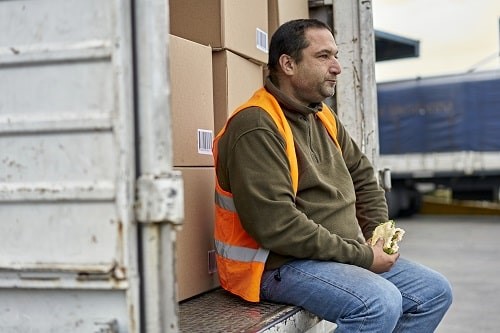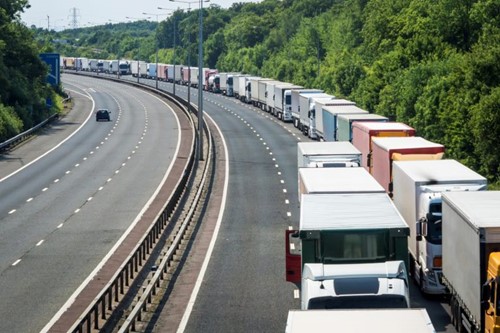Poor conditions are forcing HGV drivers off the road. What do they want to see change?
Features
Time to drive up standards
It’s a sunny day on the road to Milan, as Romanian driver, Cosman climbs up into his HGV. But it’s not the weather or the beautiful Italian scenery that’s stopping him from returning to work in the UK. “The conditions in the UK are the worst in Europe,” he says. “I am sorry to say it, but in Italy you don’t pay for showers or overnight parking. You can eat well for not much money.”
The interview featured in a Panorama documentary in December 2021 and shone a light on a little-considered factor behind the driver shortage crisis in the UK. As we saw toilets stuffed full of loo paper and one solitary, dreary shower serving 45 drivers, it begged the question: could the state of our toilets and roadside facilities be part of the reason drivers are dropping out of the industry? Could our conveniences be why drivers don’t want to work in the UK anymore?
 Pressure groups want to see not just better toilets but also affordable, healthy meals and secure parking. Photograph: iStock
Pressure groups want to see not just better toilets but also affordable, healthy meals and secure parking. Photograph: iStock
State of the sector
Drivers’ days are long and often stressful. In March 2020, nearly half (45 per cent) of the drivers questioned by YouGov said they had felt stressed, with the same number reporting heavier workloads.
At the same time regulations governing working hours have been relaxed to deal with the shortages. Drivers can now legally work up to 10 hours a day, up from nine hours and with reduced rest periods. Unite called the government’s decision in January to extend these regulations “reckless”.
It's not just stress which has fuelled an increase in drivers quitting. As well as EU drivers leaving due to Brexit, the government has pinned the blame on HGV driving test centres closing due to coronavirus as another cause.
But is this really true?
 Lorries queue on the M20 motorway in Kent. Photograph: iStock
Lorries queue on the M20 motorway in Kent. Photograph: iStock
Toilets – a final straw?
What we do know is that shortages have been building for some time now, at least dating back to 2015 when the road haulage industry estimated that it was short of about 45,000 drivers. At the height of the fuel crisis in September 2021, the Road Haulage Association (RHA) estimated the UK was short of 100,000 drivers.
Industry insiders have long been vocal about poor conditions. In 2016, the UK Parliament’s Transport Committee’s inquiry into skills and workforce planning heard how poor roadside facilities and ‘lack of decent places’ to take statutory rest breaks were factors behind driver shortages, alongside pay and ‘unsociable hours’. The issue of toilet facilities was also again high up on the agenda at the Transport’s Committee’s evidence hearing for its road freight supply chain inquiry in January.
Founder of Truckers Toilets UK (TTUK), a campaign to improve the health and wellbeing of lorry drivers, Gill Kemp explains why toilets are so an important, particularly when it comes to health and safety. “Many drivers reduce their fluid intake because of the lack of toilets. This is dangerous as research has shown dehydration can have a serious effect on driving ability. This in turn can affect other road users.”
The Transport Committee heard how secure, overnight facilities were often full by 5 o’clock in the afternoon, with more than a third (39 per cent) of drivers getting turned away. Many resort to parking illegally in laybys where they face fines of £300 by the local authorities. Gill says these laybys can also be dangerous: “Drivers in laybys are open to attack and therefore their sleep can be erratic.”
What the law says about toilets
The duty to provide decent toilets and washing facilities is in health and safety law. Regulations 20 and 21 of the Workplace (Health, Safety and Welfare) Regulations 1992 say the dutyholder must provide “suitable and sufficient washing facilities, including showers if required by the nature of the work or for health reasons, at readily accessible places.” They must have soap, towels, be well ventilated and “kept in a clean and orderly condition”.
Thanks to campaigning by TTUK and others, these regulations were changed in 2017 to apply to places a driver delivers goods to, not just fixed places of work. But in practice businesses still claim ignorance, says Samantha Bradley, an ex lorry driver who helps run the TTUK campaign. “Access to facilities has improved but drivers are still facing refusals,” she says. “This ranges from straight refusals to companies placing Portaloos’ in the corner of a yard which are not cleaned or do not have running water to wash hands.”
It has been particularly important in the pandemic for drivers to be able to wash their hands, and HSE wrote a letter reminding businesses of their duties in May 2020. “HSE guidance states that drivers must have access to welfare facilities located in the premises they visit as part of their work,” says the letter. “The responsibility in law to provide access rests with the person in control of the premises,” it clarified.
Attracting new drivers
From the frontline of recruitment, poor facilities are making it harder for employers to attract younger workers. It is also making it harder to diversify an industry which has been traditionally dominated by older, white men.
Luiza Paludo Gomes, campaigns advisor at the Recruitment and Employment Confederation (REC), says members are optimistic about recruitment in 2022. One company she knows of has been awarded a contract to run one of the government-backed HGV skills bootcamps. It was oversubscribed with 5,000 candidates applying for just 2,000 placements.
However, roadside facilities is a huge concern, says Luiza: “We have members increasing driver salaries, and showing new joiners the opportunities available to them, how they can grow. They have specific training to bring women into the industry and younger drivers. So, there’s a lot the industry is doing to improve, but roadside facilities are an issue in the UK.” She continues: “There aren’t the resting facilities, shower facilities, or toilets up to a standard you would expect of someone that basically lives on the road. Currently it’s hard to attract new talent into the industry.”
A ‘leaky bucket’
The statistics show Luiza is not alone in her concerns. Although older drivers have historically been leaving the sector in the largest numbers, more recent data shows younger drivers are now leaving. Although 30,000 more drivers came on stream in Q3 of 2021, around 9,000 drivers under the age of 45 also left, says ONS. This is nearly a third of the number who had just joined.
Paul Empson, general manager at bread delivery company Bakers Basco, calls it a ‘leaky bucket scenario’. “We’ve seen plenty of companies offer incentives and huge pay rises in an effort to attract more drivers. Yet, still people are leaving the industry. You have to wonder if it’s… [the culture] steering [young drivers] away,” he writes in his article for industry website bakeryandsnacks.com.
The reality
So far, we’ve focused on an abstract idea of ‘poor facilities’, but it’s important to look at what we mean by that. Conservative MP, Huw Merriman was forced to describe details to the inquiry, which he chairs after some MPs were ‘sniggering’ about an ‘incident with his foot’: “I got off the minibus and stood in human excrement. The Portaloo was on its side. Everyone was very sympathetic, as you can tell. That is the reality.” Gill agrees that the topic of toilets often provokes nervous laughter: “I remember talking to a couple of MPs who dissolved into giggles when the subject was mentioned due, I presume to embarrassment.” She says people are reluctant to engage. “Toilet facilities in general is not an attractive topic! But it is a very necessary one.”
 It's important to be honest about why toilets matter to worker wellbeing. Image: iStock
It's important to be honest about why toilets matter to worker wellbeing. Image: iStock
The problem is not necessarily a lack of discussion, but more one of more ownership, says Gill who has met both HSE and the Department for Transport (DfT) to discuss solutions. “There continues to be suggestions on ways forward but there are, in my view, so many participants in the mix that action is incredibly slow moving. There is no one fighting purely for their cause.” The inquiry heard of a “patchwork quilt of regulation”, with the DfT, Highways England, HSE and local authorities all playing a role in provision of facilities and enforcement.
£32.5 million for roadside facilities
Nevertheless, there is work under way to improve roadside facilities. In November 2021, the government promised £32.5 million for facilities for HGV drivers, such as showers, toilets and eating areas. Transport minister, Grant Shapps, also said the government will use planning laws to create more space for overnight parking; for example, when building new distribution centres. The government has also commissioned a review of lorry parking, which will map where the need for facilities is most urgent. It will look at what ‘levers’ it can pull to encourage the private sector to change, rather than mandate minimum standards as is the case in parts of continental Europe.
Pressure groups want to see change, not just better toilets but also affordable, healthy meals and secure parking. “All motorway service area providers in the UK fall far below their job description,” says Samantha Bradley, who says poor conditions and feeling vulnerable when parking overnight was one of the main reasons she came off the road.
Luiza Paludo Gomes says the pandemic has forced many of us to reassess our values; what we’re prepared to do for our work, and drivers are no different. “We’ve seen people leaving industries because they don’t want to work long hours anymore. They are choosing to work somewhere else. Priorities have changed – if we’re asking people to be away from their families for a long period of time to drive, we have to make that worth their while to make sacrifices.”
There are of course many reasons the sector is struggling to recruit and retain drivers.
But it’s clear that adequate roadside facilities is a big part of the equation.
“When you count all the hours you work, it’s peanuts,” said HGV driver, Tony at a recent webinar held by PIRC. “Add to that, after 15 hours of work and you try to get a proper shower, a proper toilet, decent food, well it’s hardly [worth] doing anymore.”
We need to listen to our drivers because their work is essential and important, and there is no clearer manifestation of the value with which we hold them than clean and safe toilet facilities. It is a basic and human need.
MPs debate roadside facilities in the government's road freight inquiry here
Truckers' Toilets UK website here
FEATURES

How to build circular economy business models
By Chloe Miller, CC Consulting on 07 April 2025
Widespread adoption of a circular economy model by business would ensure greater environmental and economic value is extracted and retained from raw materials and products, while simultaneously reducing carbon emissions, protecting the environment and boosting business efficiency and reputation.

What does the first year on an accelerated net zero path have in store for UK businesses?
By Team Energy on 07 April 2025
The UK is halfway to net zero by 2050 and on a new, sped-up net zero pathway. In light of this, Graham Paul, sales, marketing & client services director at TEAM Energy, speaks to TEAM Energy’s efficiency and carbon reduction experts about the future of energy efficiency and net zero in the UK.

Aligning organisational culture with sustainability: a win, win for the environment and business
By Dr Keith Whitehead, British Safety Council on 04 April 2025
The culture of an organisation is crucial in determining how successfully it implements, integrates and achieves its sustainability and environmental goals and practices. However, there are a number of simple ways of ensuring a positive organisational culture where everyone is fully committed to achieving excellent sustainability performance.



